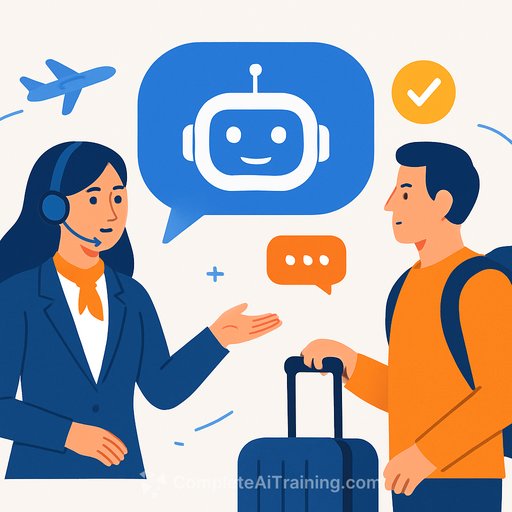Airlines Are Turning Customer Chats Into Bookings With Sabre's Concierge IQ™
Sabre has launched Concierge IQ™, a generative AI assistant that lets passengers plan, book, and manage trips through natural conversation. Think web chat, mobile apps, and even WhatsApp-without IVR loops or app-hopping. For customer support teams, this means fewer queues, faster resolutions, and new revenue from service-led sales.
Virgin Australia is the first mover, using Concierge IQ™ for real-time flight tracking, baggage updates, and a smooth booking flow inside chat. The takeaway: conversational service is shifting from FAQ bots to fully bookable, policy-aware assistants.
Why this matters for customer support
- Higher containment: Resolve rebooking, refunds, and baggage issues in-channel-no hand-offs, no channel switching.
- Faster time-to-resolution: Context persists across the conversation, so repeat questions drop and AHT goes down.
- Consistent answers: Policy changes push once, the model reflects them everywhere.
- Revenue in support: Upsells, bundles, and loyalty redemptions happen at the moment of need.
- Loyalty lift: Personalized options based on status, points, and preferences earn goodwill and repeat business.
How Concierge IQ™ works (in plain terms)
Concierge IQ™ uses large language models to understand layered requests and return bookable actions, not just links. It ties into airline systems to handle offers, loyalty redemption, and payments inside the same conversation.
Through its connection with SabreMosaic, airlines can pull customer history, operational data, and third-party services to generate relevant options fast. The platform runs on Google Cloud for scale and data throughput.
What passengers can do in one thread
- Plan: Get options that reflect schedule, budget, seat preferences, and loyalty perks.
- Book and pay: Confirm flights, hotels, and ancillaries, apply points, and complete payment securely.
- Day-of-travel: Check flight status, gate info, upgrade offers, and seat changes.
- Disruptions: Rebook during IRROPs, request refunds or credits, and see alternative routes in seconds.
- Post-trip: Track baggage, manage receipts, and request service recovery-all without starting over.
Channels your team can support
Web chat and mobile are the baseline. WhatsApp support means you meet travelers where they already message, which improves response rates and reduces abandoned sessions. The best part: customers don't need to switch apps mid-issue.
Operational changes to plan for
- Automation vs. assist: Use Concierge IQ™ for full self-service on repetitive tasks; give agents a co-pilot view for complex edge cases.
- Handoffs: Define clear triggers for human escalation (payment failures, multi-passenger disruptions, special assistance).
- Knowledge management: Centralize policies, fee rules, waiver codes, and eligibility criteria so the model stays current.
- Offer logic: Coordinate with commercial teams on upgrade rules, bundles, and loyalty burn/earn rules to prevent service friction.
- Security and compliance: Use PCI-compliant payment flows and protect PII with strict data retention windows and access controls.
Core metrics to watch
- Containment rate (self-serve completion without agent)
- First contact resolution and AHT
- Refund/rebooking cycle time during disruptions
- CSAT/NPS by intent (baggage, rebooking, loyalty)
- Revenue per contact and offer acceptance (upgrades, ancillaries)
- Loyalty engagement (redemptions, status usage, repeat bookings)
Implementation checklist (use this to reduce risk)
- Map your top 20 intents by volume and pain: rebook, refund, seat change, baggage claim, name correction, schedule change.
- Stand up policy-backed flows for the high-cost intents first (refunds, IRROPs).
- Define tone of voice and escalation rules; keep it consistent across channels.
- Run a limited rollout on one region or route, then expand with A/B tests and clear guardrails.
- Instrument every step: log prompts, outcomes, and offer acceptance to improve the next release.
What SabreMosaic adds under the hood
SabreMosaic gives airlines a modular, API-driven retailing layer that manages offers across channels while tapping into customer and operational data. That supports dynamic pricing, consistent servicing, and faster delivery of new features.
If you want to go deeper into the platform's role in airline retailing, start with Sabre's product overview at sabre.com.
Virgin Australia's early use case
Virgin Australia is applying Concierge IQ™ to booking, flight tracking, and baggage updates inside a single conversation. Customers can also purchase and upgrade services directly in chat, which streamlines support and adds incremental revenue without a hard sell.
For support leaders, this is a practical blueprint: prioritize disrupted travel, baggage, and payment flows first; then layer in upgrades and bundles once service quality stabilizes.
Agent experience: what changes on the floor
- Less swivel-chair work: The assistant keeps context, so agents don't re-ask basics.
- Better triage: The system pre-classifies intents and surfaces policy snippets with suggested actions.
- Smarter offers: Context-aware upsells feel helpful, not pushy-timed to the customer's actual need.
Risks to avoid
- Ambiguous refund rules that create exceptions staff can't honor.
- Unclear opt-ins for promotions inside service threads.
- Under-instrumented launches-no feedback loops, slow fixes.
What to do next
- Audit your top intents and failure points; pick three to automate end-to-end.
- Document policies as structured data, not PDFs.
- Set success criteria: containment, CSAT, and revenue per contact.
- Pilot on one channel (web or WhatsApp), then expand with tight monitoring.
Level up your team's AI skills
If you're skilling up support leaders and agents for AI-assisted operations, explore practical training paths by role here: Complete AI Training - Courses by Job.
Your membership also unlocks:






